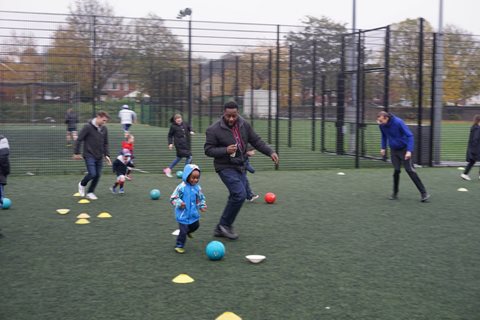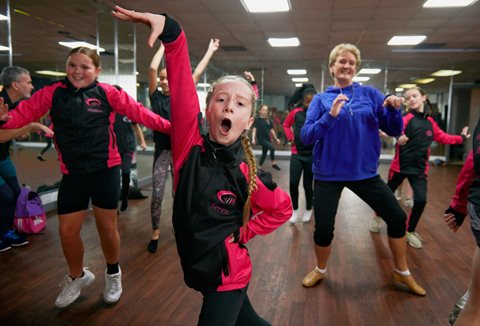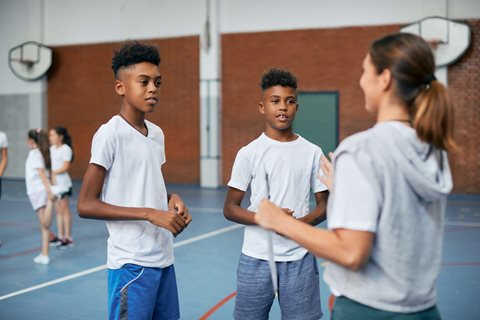Our cookies
We use essential cookies to make our website work smoothly for you. To make sure we're always improving, we'd like to use analytics to track how people use the site. We won't set non-essential cookies unless you give us permission. You can find more information about all the cookies we use in our Privacy and Cookie Policy.
Some cookies are a must for our website to function properly. If you turn off essential cookies, it may affect how you experience our site.
The non-essential cookies we use help us understand how you use our website and make improvements to enhance your experience.
Step Up Your Game: A Playful Guide to Coaching Children's Football
Football is the national sport and it’s no surprise that children and young people love to play it. Coaching children’s football offers so many opportunities to develop not just their skill and technique but your own abilities as a coach.
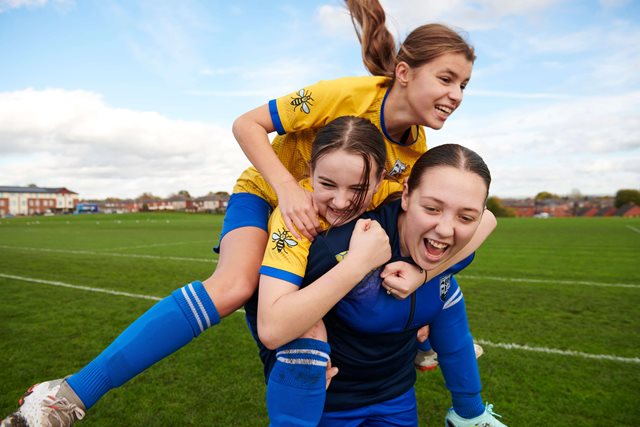
Included in this article:
- CHOICE: Embracing fun and the power of play
- CHOICE: The right skills for the right age groups
- Download 6 free tips for child-first coaching
- JOURNEY: Why it is necessary to gauge each child's skill level
- Tips for watching football games together
- VOICE: The power of creativity
- Developing a football coaching philosophy
- Play Their Way Podcast episode with Nick Levett
Kids Football Coaching Tips & Need-To-Knows
Whenever you’re working with children, the particular dynamic of the group needs to be taken into account – but there are a few useful ideas on how to teach kids football that the best coaches would bear in mind.
Embrace fun and the power of play
“Embrace the power of play and fearless exploration,” says Jamie Williams, a children’s football coach. Ensuring that everyone is having fun – players and coaches – is paramount. He says coaches shouldn’t get themselves too caught up with statistics and keeping count of goals – what’s important when thinking about how to teach kids football is measuring the amount of smiles and laughter during a session.
Learn more about how to create fun coaching sessions with our article on engaging football game ideas for kids.
Use the right football skills for the right age groups
Before you start thinking up some brilliant games and practices to try out, any activities in a session should only be undertaken if the children you are coaching actually want to do them – so make sure you’re talking to them.
“Start with the child in mind and explore the skills they feel most excited and interested to explore,” says Jamie. That way, he says, every single session when you’re coaching youth football will be fun – and that is the most important thing to consider.
Challenge Yourself: Involve children in decision-making processes with this simple download resource to encourage choice in your session.
It’s always fun improving skills and getting better, particularly if the children feel excited, inspired and connected to the skills being practised. In order to gauge and appropriately plan for this I recommend carefully considering the age and stage characteristics of the children you coach. By starting with the child first, we can create practice and games to suit.”
Jamie Williams Children's football coach
Another way to think about that is to remember why the children decided to sign up for your sessions in the first place – most probably because they like playing football. That means, Jamie says, that when you think about how to teach kids football, you should think about making practice as much like the game as possible – with a ball, with teams, and with goals.
But that doesn’t mean playing a full 11-a-side match. Jamie suggests you could try a 1 v 1 duel, or small-sided games, with goals as end zones rather than full-sized nets. That way children can focus on individual techniques and tactics as well as combining and connecting in small groups.
“When we throw practice at players in this way we increase the opportunity for children to practice skills that relate to the game. They will experience the directional nature of the game, adapt to changing spaces and varying pressure making them more skilful, adaptable problem solvers. By using small sided games we give more players more opportunity to enjoy and interact with the ball.”
Nick Levett, Head of Coaching at Brighton & Hove Albion, agrees.
“The skills that need to be developed over the younger age are more multi-skill and multi-sport, so I’ll do a lot of stuff with the kids with the ball in their hands because it's developing hand-eye coordination, or we’ll do a lot of games that focus on agility and balance and coordination,” he says.
Some of Nick’s suggestions for activities include:
- Use balloons instead of footballs – this slows down the activity.
- Practise throwing, catching and kicking with different objects, such as tennis balls, bean bags and hoops. “What you want them to focus on is the ball and not their body,” explains Nick.
- Tap into everyday life. “Maybe you need to create a game that's linked to the children’s favourite television programmes because that’s what’s going to capture the imagination of the kids,” says Nick.
5 Tips for Child-First Coaching
Don't drop the ball! Download our free tools, tips and games and grow your coaching practice – like these 5 tips which support children to Play Their Way.
DOWNLOAD TIPS
Gauge the children’s skill level
Of course, you need to know the skill level of the group you’re working with when you’re coaching youth football – so you’ll be watching them play.
“What do you notice? What are they good at, what are they not so good at? Then when you start to put what you’ve noticed into practice, focus on elements of the game that you want to help them get better at,” says Nick.
Jamie adds: “Rather than simply evaluating what a player can or cannot do and placing them into boxes I’d encourage coaches to ask themselves, ‘What is this player’s next level?’ and ‘Who do they need us to be in order to help them level up?’
“Put simply, things improve when we put the players at the centre of our thinking and when we involve them.”
And when you’re coaching children’s football, it’s crucial to remember you’re not just showing them how to play a sport. You’re also teaching them about sharing, about communication, about teamwork and more.
Find out more about how to coach kids with mixed abilities
As a coach you park your ego at the door, because it's not about you. It's about you as an adult helping a group of young people develop as young people and as footballers - we use football as the vehicle to develop them.”
Nick Levett Head of Coaching, Brighton & Hove Albion
Watch football games together
For people who have been watching football for a long time, it might take a bit of work to view competitive matches differently – but Jamie suggests that if you’re watching alongside the children you coach, a tweak of perspective is important. Don’t present a match as a big one-off event, he suggests, as it’s likely to encourage the children to think of results as the be-all and end-all.
“The coach who chooses to look upon the game as an experience is much more likely to be learning-focused,” says Jamie. “This coach will be more likely to create an environment for the players, parents and coaches which is positive and progressive regardless of what result the scoreboard displays.”
Let both the kids and the coach be creative
Of course you’ll use your own ideas for sessions, but involve the children in their own development and give them input to each session – their imaginations and creative reserves are limitless.
Creativity is a key part of our child-first coaching philosophy. Read more to find out more about how to put children first in your coaching practice.
Imagine a world where every young person involved in sport has the opportunity to be part of something that excites, inspires, challenges and supports them to have a great time in pursuit of being the most awesome version of themselves. Now let’s go about thinking up ways to achieve this!”
Jamie Williams Children's football coach
Develop a football coaching philosophy
Think about whether you already have your own philosophy of how to teach kids football [possible internal link out] – capturing your vision and values as well as your motivations. How has it changed and developed since you began coaching children’s football? Your experiences will certainly shape any philosophy as you go through your coaching journey.
“Our coaching philosophy develops, moulds and grows with us and it is for this reason that I’d encourage all coaches to remain curious, studious and open-minded,” says Jamie. “After all, better coaches are better equipped to develop better players.”
If Nick had to pin down his own philosophy, he would describe it as “person first, player second” – and he’d also add on what he describes as the three Ls – no lines, no laps, no lectures.
“No lines - the worst thing is you’ve got a line of 15 kids stood waiting their turn and those right at the back switch off task, because of the coach’s design,” he says. “No laps - we don't need to see kids in running in laps around the place because that's not what football games look like. No lectures - kids don't need a 10-minute monologue from a coach, so if you’re going to speak to them, bring them in, 60 seconds max, then off they go.”
Read our article on coaching rugby to kids to learn more about coaching ball games to children in a child-first way.
Join Laura-Jane Jones in this captivating episode of the Play Their Way Podcast as Nick Levett delves into co-creating with children, involving parents, and the magic of rolling out engaging games.
Other resources you may like...
About the contributors

Jamie Williams is an experienced coach, coach developer and mentor who has been engaged with football for 18 years, supporting players and coaches within grassroots, academy and educational settings. His interest sits largely within the space of coaching children aged between 5-12 years old. As a coach of young players he strives to create environments that enable children to play with freedom and express their creative spirit through play.
Nick Levett is UK Coaching's former Head of Coaching. He also worked at The Football Association for 14 years, leading national projects in a variety of areas from education to managing a national skills coaching programme for 5-11 year olds with 90 full-time coaches. He has been a football coach for 25 years, running grassroots teams through to working with players that are now international footballers and playing in the Premier League.
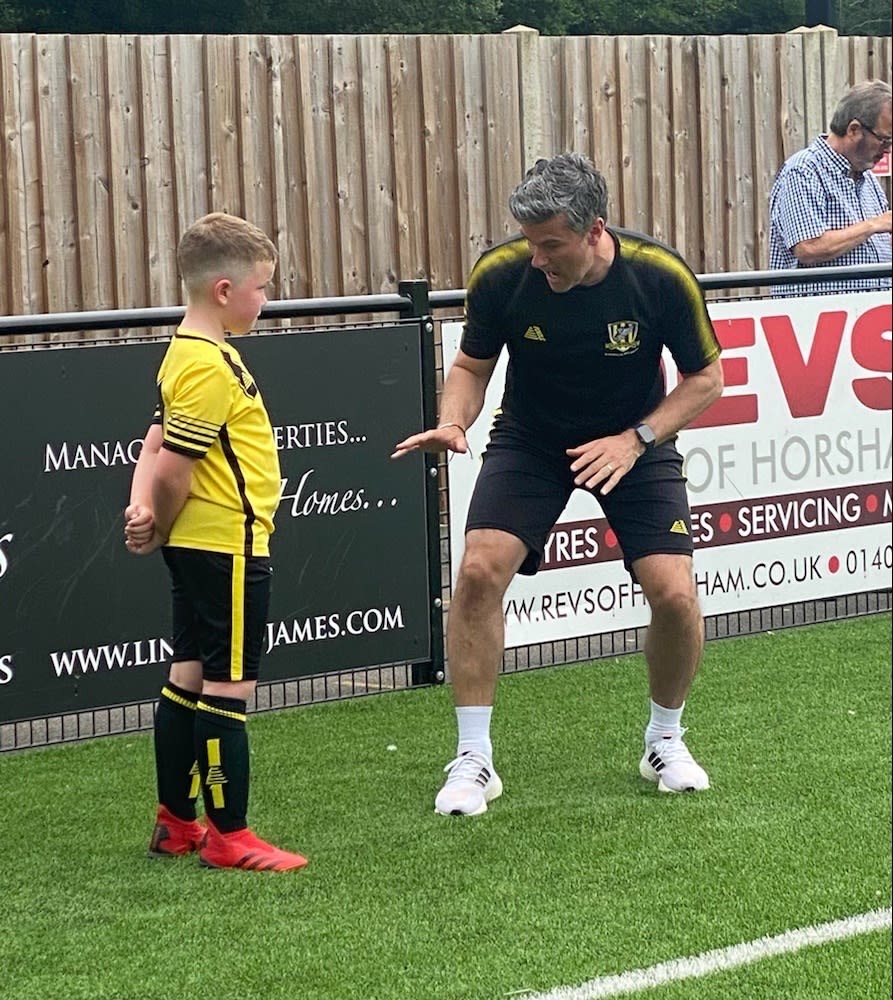
SHARE THE MOVEMENT
Help spread the word by sharing this website with fellow coaches!


